Photograph features some of the speakers at the event. Lefhoko Kesamang, Senior Social Welfare Officer, African Union Commission (first from left)Mr. Musie Tilahun Yirga, Executive Director, Ethiopian Lawyers with Disabilities Association (third from left); Shitaye Astawes, Director of Advocacy & Communications, Africa Disabilities Forum, Ethiopia (centre)Dr. Satish Mishra, Head, Programmes & Markets, ATscale (second from right)
Photo: ATscale
The African Union took a significant step forward last month by committing to develop a comprehensive Assistive Technology (AT) strategy for Africa, recognizing the importance of accessible and affordable AT across Africa.
This commitment was made during a side event entitled promoting access to assistive technology in Africa , co-hosted by the African Union, ATscale, the Global Partnership for Assistive Technology and the International Labour Organization (ILO) . The event took place during the African Union's 5th Ordinary Session of the Specialized Technical Committee on Labour, Employment & Social Development). The overarching theme of the session centered around the "Social Agenda 2063: Promoting Social and Solidarity Economy Ecosystems."
"To transition from the commitment of member states to concrete action, the African Union proposes drafting a strategy on assistive technology for Africa. The Secretariat is ready to lead such an effort with the collaboration of member states." said AU Senior Social Welfare Officer, Mr. Lefhoko Kesamang.
The event fostered a rich exchange of ideas from diverse stakeholders drawn from government representatives, international organizations, advocacy leaders, and assistive technology users. The multi-sectoral discussion focused on both challenges and opportunities in promoting access to assistive technology across Africa. Local production of assistive products emerged as a potential strategy to reduce costs and improve availability. The concept of regional distribution hubs was proposed to streamline supply chains and ensure wider reach. Additionally, the establishment of centres of excellence was suggested to drive research, innovation, and best practices in assistive technology.
Dr. Dereje Duguma, State Minister of Health, Ethiopia highlighted the critical role of assistive devices in achieving universal health coverage stating that, "Universal Health Coverage (UHC) without assistive technology is not UHC at all.” This perspective underscored the need to integrate assistive technology into broader health and social development strategies across the continent.
Despite the recognized importance of access to affordable and appropriate assistive technology as a human right, significant disparities persist in access. While high income countries boast a 90% access rate, only 10% of people in low-income nations have access to the assistive products they require, which underscores the urgent need for action.
The AU has adopted the Protocol to the African Charter on Human and People’s Rights on the Rights of Persons with Disabilities in Africa in 2018 and published the African Union Disabilities Inclusion Guideline in 2020. As the AU works to ratify these instruments with member states, developing an AT strategy is timely to advocate for ratification and translate commitments into action.
“By committing to develop this strategy, the African Union is poised to create a more inclusive society where assistive technology serves as a catalyst for empowerment. This initiative could significantly enhance the quality of life for individuals with disabilities, enabling them to participate more fully in education, employment, and community life” said Dr. Satish Mishra, Head of Global Programmes, ATscale
“The success of this strategy will depend on continued collaboration between governments, international organizations, advocacy groups, and the private sector to translate commitments into tangible changes across Africa” said Dr. Mishra.

